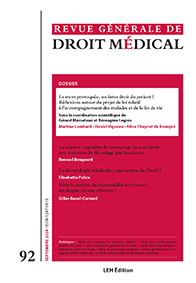Résumé
Le projet de loi relatif à l’aide médicale à mourir qui était examiné par l’Assemblée nationale avant qu’elle ne soit dissoute pourrait de nouveau occuper le Parlement dans un avenir proche. L’aide à mourir est présentée comme un soin d’accompagnement de malades en fin de vie, mais c’est pour éviter de parler d’euthanasie ou d’assistance au suicide. Les conditions prévues pour légaliser l’aide à mourir, soi-disant strictes, se révèlent à l’analyse imprécises, ineffectives et, pour tout dire, trompeuses. Le périmètre de la légalisation est en outre appelé, inéluctablement, à s’élargir dans le futur. Tout cela aboutira à instituer à terme une liberté individuelle de choisir le moment de sa mort, en profonde rupture avec l’interdit de tuer une personne humaine, même à sa demande : un interdit pourtant traditionnel et fondamental de notre société.
Mots-clés
Aide médicale à mourir – Euthanasie – Assistance au suicide – Fin de vie – Mort
Abstract
The bill relating to medical assistance in dying, which was being examined by the National Assembly before it was dissolved, could occupy Parliament again in the near future. Assisted dying is presented as support care for patients at the end of life, but this is to avoid talking about euthanasia or assisted suicide. The conditions provided for legalizing assistance in dying, supposedly strict, reveal upon analysis to be imprecise, ineffective and, quite frankly, misleading. The scope of legalization is also inevitably set to expand in the future. All of this will ultimately lead to the establishment of individual freedom to choose the moment of one’s death, in profound contrast to the prohibition on killing a human person, even at their request: a prohibition that is nevertheless traditional and fundamental to our society.
Keywords
Medical assistance in dying – Euthanasia – Assisted suicide – End of life – Death



